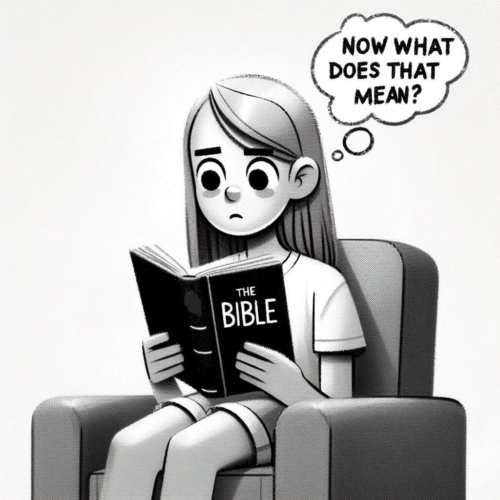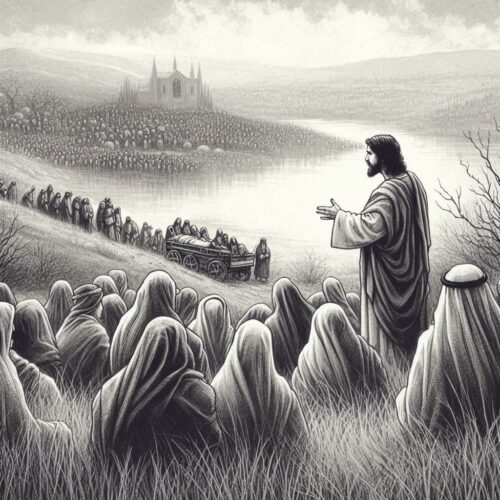What’s the Regulative Principle? And Why Does It Still Matter?
Picture this: Two priests approach God’s altar with fire in their censers. They’re sincere, devout men performing what seems like a reasonable act of worship. But something goes terribly wrong. In an instant, fire from the Lord consumes them both (Leviticus 10:1-2). Their crime? Offering “unauthorised fire” before the Lord—worship that God hadn’t commanded.
This shocking story illustrates a principle many modern Christians have forgotten: God alone determines how He is to be worshipped. We don’t get to add our own creative touches, no matter how well-intentioned. This is the heart of what theologians call the Regulative Principle of Worship (RPW)—the idea that corporate worship must be governed by what Scripture commands or clearly warrants, not simply by what it doesn’t forbid.
This stands in contrast to what some call the “Normative Principle,” which says anything not explicitly forbidden in worship is permitted. The difference isn’t merely academic—it concerns God’s honour and our obedience as His people.
BIBLICAL FOUNDATION: GOD’S EXCLUSIVE RIGHT TO PRESCRIBE WORSHIP
Scripture consistently insists God reserves the right to determine how He will be approached in worship. Consider these key examples:
- The Second Commandment goes deeper than idol-making. Exodus 20:4-6 doesn’t just prohibit carved images—it forbids any form of worship that God hasn’t appointed. As John Calvin observed, this commandment prohibits worshipping the true God in ways He hasn’t prescribed. The Westminster Larger Catechism puts it plainly: God forbids “devising any religious worship not instituted by God himself.”
- Good intentions aren’t enough without divine command. Cain’s offering in Genesis 4:3-5 seemed reasonable, yet God rejected it while accepting Abel’s sacrifice. The difference wasn’t in their hearts but in following God’s specific requirements. Similarly, when Moses struck the rock instead of speaking to it as God commanded, the consequences were severe (Numbers 20:7-12).
- Human reasoning cannot override divine prescription. When Uzzah reached out to steady the ark of God, his motives were good—he wanted to prevent it from falling (2 Samuel 6:6-7). Yet God struck him down instantly. The ark was to be carried only by Levites using poles, not transported on a cart. Good intentions couldn’t justify disobeying God’s clear instructions.
- Jesus Himself confirmed this principle. In Matthew 15:8-9, Christ condemned those who taught “as doctrines the commandments of men,” saying their worship was “in vain.” John 4:23-24 tells us true worshippers must worship “in spirit and truth”—and truth means according to God’s revealed will, not human innovation.
REFORMED CONFESSIONAL WITNESS
The Protestant Reformers and their successors understood this biblical principle clearly, embedding it in their confessions and theological writings:
The Westminster Confession establishes the foundation. Chapter 21.1 states “the acceptable way of worshipping the true God is instituted by himself” and warns that He has not “left it unto men’s discretion to worship him according to their own imaginations.” This wasn’t mere human reasoning but careful reflection on Scripture’s teaching about worship.
Continental Reformed churches agreed. The Belgic Confession (Article 32) insists worship must follow Scripture’s “rule and measure.” John Calvin wrote in his Institutes “God disapproves of all modes of worship not expressly sanctioned by his Word.” This wasn’t a quirk of one individual but the consensus of Reformed Christianity.
The Puritans developed careful distinctions. Scholars like Richard Baxter distinguished between the “elements” of worship (what we do) and the “circumstances” (when and where we do it). The elements must have biblical warrant; the circumstances can be arranged for decency and order. John Owen warned against “will worship”—the human tendency to create religious practices based on our own preferences rather than God’s commands.
Scottish Reformers applied it radically. John Knox and others removed every element from worship that couldn’t be clearly supported from Scripture. Their goal wasn’t to make worship bare but to ensure it honoured God’s exclusive right to determine how He would be approached.
COMMON OBJECTIONS ADDRESSED
Critics often raise predictable concerns about the Regulative Principle (RPW), but these objections don’t hold up under scrutiny:
- “The RPW makes worship cold and restrictive.” Actually, God’s prescribed worship is remarkably rich and varied—consider the Psalms alone with their emotional range from despair to ecstasy. The temple worship was highly regulated yet deeply meaningful to those who participated. Puritan worship, often caricatured as dry, was actually passionate and heartfelt within biblical boundaries.
- “The New Testament gives us more freedom in worship.” Greater spiritual freedom doesn’t mean less regulation but rather worship “in spirit and truth.” The apostles followed careful patterns in their worship gatherings (Acts 2:42, 1 Corinthians 11-14). Even Jesus observed prescribed worship forms, regularly attending synagogue and keeping the Passover. Freedom in Christ means liberty to worship God as He desires, not as we prefer.
- “The RPW eliminates needed cultural adaptation.” The Regulative Principle actually helps here by distinguishing between biblical elements (unchanging across cultures) and circumstances (which can be culturally adapted). Singing psalms is commanded; using organ accompaniment is a circumstance. We can engage contemporary hearts while honoring Scripture’s authority over the essential elements of worship.
- “It’s impossible to prove everything from Scripture.” This misunderstands the principle. We’re not required to find explicit verses for every detail, but rather clear warrant for the elements of worship we practice. Scripture provides both direct commands and approved examples. The burden of proof lies on those who would add elements, not on those who question additions.
PRACTICAL APPLICATIONS FOR TODAY
So what does this look like in practice? The RPW includes clear biblical elements: the reading and preaching of God’s Word, prayer, the singing of psalms and hymns, and the proper administration of baptism and the Lord’s Supper. These can be conducted with appropriate circumstances—orderly times, suitable places, and decent arrangements that serve the gospel.
However, the principle raises questions about innovations that lack clear biblical warrant in corporate worship: liturgical dance as a regular worship element, dramatic performances replacing proclamation, or altar calls treated as essential parts of worship rather than evangelistic methods. The test isn’t whether these are necessarily wrong, but whether Scripture commands or clearly warrants them as normative elements of corporate worship.
Implementing these convictions requires pastoral wisdom. We must distinguish between biblical conviction and personal preference, introduce changes gradually with patient teaching, and remember our goal is to honour God, not winning arguments or imposing preferences.
SAFEGUARDING GOD’S GLORY
The Regulative Principle isn’t about restricting worship but about protecting God’s exclusive right to determine how He will be approached. It guards against the human tendency to improve on God’s designs or to trust our innovations over His wisdom. At its heart, this is a gospel issue: Christ perfectly fulfilled all worship requirements on our behalf, and we now worship through His merit alone, following the patterns He has established.
As the writer of Hebrews reminds us: “Let us offer to God acceptable worship, with reverence and awe, for our God is a consuming fire” (Hebrews 12:28-29). The question each church must ask is simple but searching: Do our worship practices honour God’s exclusive right to determine how He is approached, or have we, however well-intentioned, begun offering “unauthorised fire” before the Lord?
The stakes are too high, and God’s glory too precious, for us to trust our innovations over His clear instructions.
WHAT’S THE REGULATIVE PRINCIPLE? RELATED FAQs
Does the Regulative Principle forbid all hymns written after biblical times? No, most Reformed scholars distinguish between the content and form of congregational singing. The principle requires biblical content (psalms, hymns based on Scripture, songs expressing biblical truths), but doesn’t mandate that only inspired text can be sung. Charles Spurgeon, John Piper, and other Reformed leaders have defended hymns that faithfully express scriptural teaching, arguing Ephesians 5:19 and Colossians 3:16 permit “hymns and spiritual songs” beyond the Psalter.
- What about practices such as making the sign of the cross—is this forbidden? This divides Reformed scholars. Strict adherents like the Westminster divines would question it as lacking clear scriptural warrant in corporate worship. However, others argue it’s a permissible circumstance since it simply expresses biblical truth (remembering Christ’s cross) through gesture rather than adding new worship content. Modern Reformed theologian RC Sproul was sympathetic to this view, though he acknowledged the debate.
- Are Christmas and Easter services violations of the Regulative Principle? Historical Puritans said yes, viewing these as human additions to the church calendar without biblical command. However, many contemporary Reformed scholars like Sinclair Ferguson and Derek Thomas distinguish between observing biblical events (Christ’s birth, resurrection) and mandating specific dates as holy days. They argue commemorating gospel events falls under general biblical warrant for remembering God’s works, though the timing remains a matter of circumstance.
How do modern Reformed scholars handle worship technology and contemporary music styles? Most contemporary Reformed leaders treat these as circumstances rather than elements. John MacArthur, Alistair Begg, and others argue electric guitars, projectors, and contemporary musical styles are simply tools—the question is whether the content honours Scripture and serves the gathered church. The principle governs what we do (sing biblical truth) more than how we do it (acoustic vs. electric instruments).
- What about spontaneous prayer versus written liturgy—which does the principle require? Reformed scholars generally see both as permissible since prayer itself is clearly commanded, while the specific form (spontaneous or liturgical) is circumstantial. Joel Beeke argues both approaches can honour Scripture, though he warns against liturgies that replace biblical content with human tradition. The key question isn’t the style but whether the prayers conform to biblical patterns and express scriptural truth.
- Does the Regulative Principle apply to wedding ceremonies and funerals held in church? This is debated among Reformed theologians. Kevin DeYoung and others argue these aren’t corporate worship services but pastoral ministries that can include appropriate ceremonial elements. However, strict adherents insist any church gathering should follow worship principles. Most modern Reformed pastors take a middle path, ensuring these services centre on Scripture and prayer while allowing some ceremonial flexibility.
How does the RPW relate to charismatic worship practices like speaking in tongues? Reformed cessationists like John MacArthur argue the sign gifts ceased with the apostolic era, making modern charismatic practices both theologically questionable and violations of the Regulative Principle. However, Reformed continuationists like Wayne Grudem and Sam Storms contend that if these gifts remain valid, they must be exercised according to Paul’s regulations in 1 Corinthians 14. Both sides agree any authentic spiritual gift must conform to Scripture’s guidelines for orderly worship.
WHAT’S THE REGULATIVE PRINCIPLE? OUR RELATED POSTS
Editor's Pick

Cities of Refuge: Foreshadowing Our Safe Haven in Jesus
Picture this: A man is chopping wood with his neighbour when the axe head flies off the handle, striking and [...]

Testament to Design: The Engineering Marvel of Elephants
Picture an African elephant delicately plucking a single acacia leaf with the tip of its trunk, then moments later using [...]

Blue Whales: Mammoth Icons of Intelligent Design
Imagine an animal so massive its heart alone weighs as much as a small car, yet so precisely engineered it [...]

Do Unbelieving Kids Disqualify Church Leaders?
REFORMED PERSPECTIVES ON 1 TIMOTHY 3 AND ELDER QUALIFICATIONS Every pastor knows the heartbreak. A faithful elder who has served [...]

Why Did God Kill Onan? Wasn’t the Punishment Disproportionate?
The story of Onan in Genesis 38 troubles many. Why would God strike down a man for what seems like [...]

Is God Preparing Me for Ministry? How May I Know for Sure?
The question haunts many faithful believers. You’re serving faithfully in your local church, perhaps teaching Sunday school or leading a [...]

Ephesians 1:13: Was the Spirit’s Indwelling Promised of Old?
When Paul declares believers are “sealed with the promised Holy Spirit” in Ephesians 1:13, one word jumps off the page: [...]

Monergism vs Synergism: Is Salvation God’s Work Alone?
When God saves us, does He do it alone, or does He need our help? The question isn’t mere theological [...]

Was Jesus Abandoned by the Father on the Cross?
WHY WE ANSWER IN THE NEGATIVE “My God, my God, why have you forsaken me?” These words from the cross [...]

Why Do Some Respond to God’s Call While Others Don’t?
THE REFORMED VIEW ON OUTWARD AND INWARD CALLS EXPLAINED Picture this: Two neighbours attend the same church service. They hear [...]
SUPPORT US:
Feel the Holy Spirit's gentle nudge to partner with us?
Donate Online:
Account Name: TRUTHS TO DIE FOR FOUNDATION
Account Number: 10243565459
Bank IFSC: IDFB0043391
Bank Name: IDFC FIRST BANK






